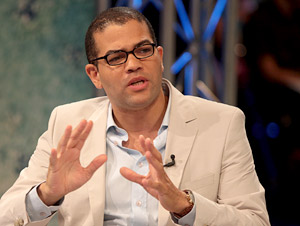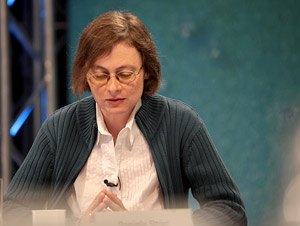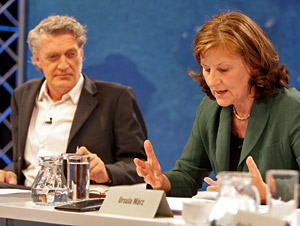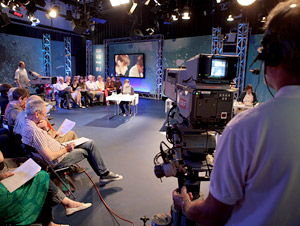
Different approaches to one single text.
"Alive in the Air" by Heike Geißler opened the second and final day of readings of this festival of German language literature 2008. Although it was Ursula März, who invited the German author to Klagenfurt it was Ijoma Mangold, who was to prove even more effusive in his support for the text than his fellow juror.
Presenter Moor declared himself to be in amazement following the discussion at how many different approaches the text permits.
Language of "great narrative proficiency"
Ijoma Mangold stated that he had immediately read the text about a tour guide who invents an angel with great interest. "The angel devotes itself to the bold and noble task, borrowed from religious teachings, of leading us into transcendency, into the metaphysical and that which is beautiful." The chosen language is of "great narrative proficiency and subtlety".

His one reservation was that he wished the angel had been "even bolder still", as from the middle of the text onwards it begins to take on something of a pathological aspect for the protagonist: "The author climbs the 10- metre-tower full of courage, only to retreat step by step before jumping from the 3-metre-board".
For Strigl it was a "punch in the pit of my stomach"
"This is a difficult case", was the not-overly impressed Daniela Strigl's criticism. The language is too "flowery" for her. "Too pretentious - with incorrect use of the subjunctive, but I don't want to be too petty". Even so, she added: "The text hit me like a punch in the pit of my stomach and as we know, the best moment is when the pain subsides".

Spinnen: "An adventurous construction"
Burkhard Spinnen gave voice to his concern that the "indecisiveness" of the text had completely confused him. Was this a "deliberate change of course" on the part of the author? - He praised the "adventurous construction".
März: "I wholeheartedly approve of this text"
Ursula März said: "This is a daydreamer, like Meister Eder and his Pumuckel character". Daydream and reality double up in the text which explains "this" language which seeks to distance itself from reality, as she understands it, to reflect what is going on in the man's head. "I wholeheartedly approve of this text".

The jury was not unanimous
Ijoma Mangold found this interpretation of the text to be "too gentle, too withdrawn, too timid".
Andre Heiz was disappointed that the angel "is not on a par " with the man. It comes, and then all of a sudden it is taken away from us again", however, he congratulated the author for her "courage".
Klaus Nüchtern remarked: "Well, Meister Eder and his Pumuckl" - that is exciting and ambitious; the language that Strigl criticised, a "highly artificial idiom", is appropriate here in his view. Nüchtern compared it to the "somewhat circuitous", but "coherent" puzzling precision of someone who builds ships in bottles".

Sulzer remained "at a loss"
Alain Claude Sulzer saw it differently. He criticised the "biblical tone". He was left "at a loss" by the text, it comes across as rather "stilted". "This is more of a goblin than an angel". Perhaps the author's age has something to do with it?